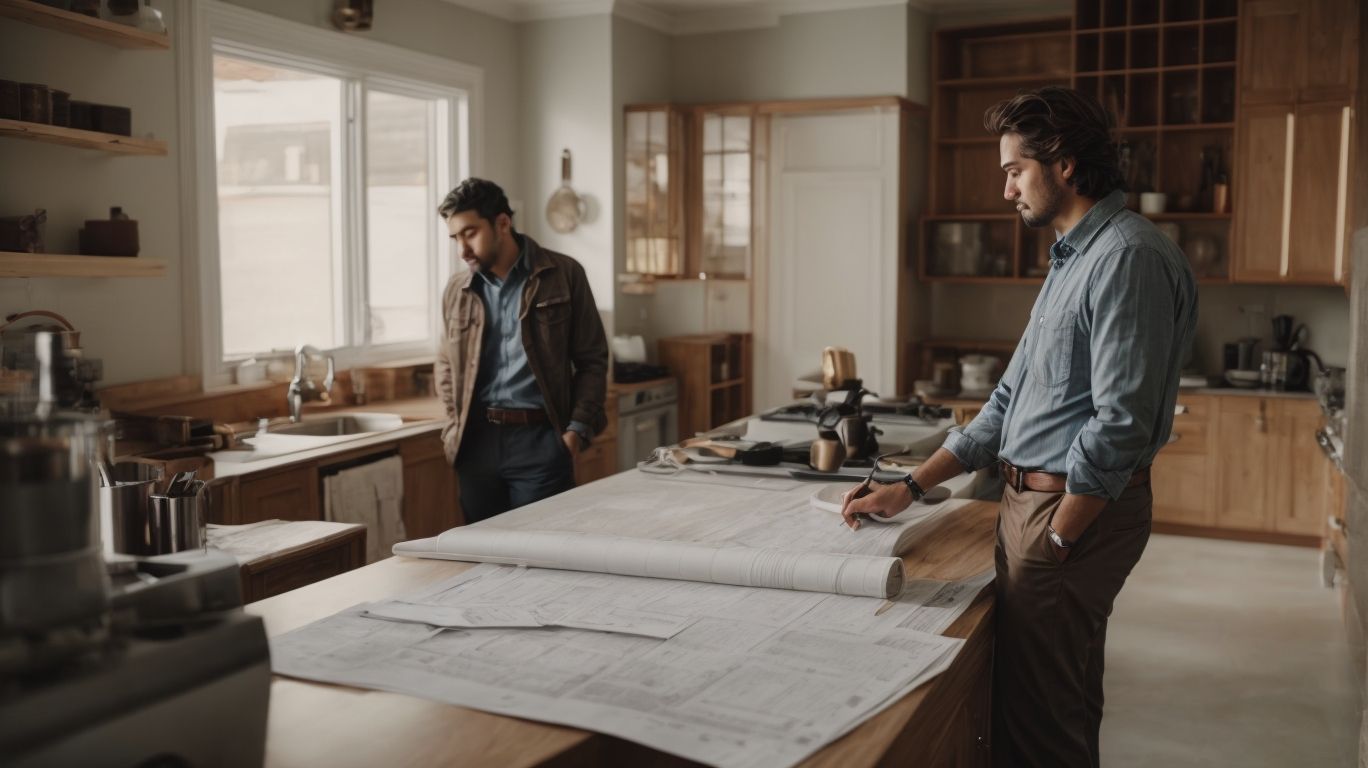
Avoiding Common Mistakes in Home Remodeling: Engineer’s Advice
In the world of home remodeling, the excitement of creating your dream space can often overshadow the importance of avoiding common mistakes that can lead to costly setbacks and headaches down the road. As an experienced SEO Expert, I have seen firsthand the impact of overlooking crucial details in the remodeling process. In this article, I will provide valuable insights and tips based on an engineer’s advice on the common mistakes to avoid in home remodeling.
From setting a realistic budget and hiring a professional engineer to prioritizing safety and planning for unexpected costs, we will delve into the essential considerations that every homeowner should keep in mind when embarking on a remodeling project. Whether you are a seasoned DIY enthusiast or enlisting the help of contractors, this article aims to equip you with the knowledge to ensure a successful and stress-free remodeling experience. So, let’s roll up our sleeves and explore the key pitfalls to steer clear of, and the actionable tips to navigate the home remodeling journey with confidence and clarity.
Why is it Important to Avoid Common Mistakes in Home Remodeling?
Avoiding common mistakes in home remodeling is crucial for ensuring a successful and satisfactory outcome of the renovation project. Making errors during the remodeling process can lead to unnecessary expenses, unsatisfactory results, and potential safety hazards within the home.
It is essential to carefully plan and strategize the remodeling process to avoid overlooking important details, such as structural integrity, wiring, and plumbing. Utilizing professional expertise and adhering to local building codes can prevent costly mistakes while ensuring the safety and functionality of the renovated space.
By prioritizing proper budgeting, material selection, and project management, homeowners can harness the transformative power of a well-executed renovation, enhancing both the aesthetic appeal and the long-term value of their property.
Common Mistakes to Avoid in Home Remodeling
In the realm of home remodeling, several common mistakes can significantly impact the success of a renovation project. Avoiding these errors is essential for ensuring a smooth and satisfying remodeling experience, while achieving the desired improvements within the home.
Not Setting a Realistic Budget
One of the most crucial aspects of home remodeling is setting a realistic budget to guide the renovation process effectively. Failing to establish a feasible financial plan can lead to overspending, incomplete renovations, and dissatisfaction with the final outcome.
By carefully considering the scope of your renovation project and conducting thorough research on the costs of materials, labor, and potential unforeseen expenses, you can create a practical budget. Prioritizing essential improvements and seeking multiple quotes from contractors can also help in estimating costs accurately. Setting aside a contingency fund for unexpected expenses is essential to ensure that your budget remains manageable.
Taking these steps can support financial prudence and ensure that your home remodeling project stays on track, ultimately leading to a satisfying outcome.
Not Hiring a Professional Engineer
One of the critical errors to avoid in home remodeling is not enlisting the expertise of a professional engineer. A skilled engineer can provide invaluable insights, structural assessments, and technical guidance to ensure the safety and integrity of the renovation project.
Their knowledge and experience in home renovation engineering can help homeowners navigate complex structural considerations, avoid costly mistakes, and ensure compliance with building codes. Professional engineers can also offer innovative design solutions that enhance the functionality and aesthetic appeal of the renovated space.
By seeking an engineer’s advice, homeowners can have peace of mind knowing that the project is being managed with a focus on safety and long-term durability.
Not Obtaining Proper Permits
Obtaining the necessary permits for home remodeling is an essential step to avoid legal and regulatory complications. Failing to secure proper permits can result in project delays, fines, and even the need to undo completed work, leading to substantial inconvenience and additional costs.
It is crucial to adhere to the local building codes and regulations, which may differ based on the location and the scope of the renovation project. The permit application process requires detailed documentation, including architectural plans, engineering specifications, and sometimes environmental assessments. Homeowners should ensure that their remodeling plans align with the zoning laws and structural requirements to obtain the necessary permits.
Engaging with a professional contractor or consulting with the local building department can provide valuable guidance in navigating the complexities of permit applications and compliance with regulations for home improvement projects.
Not Having a Detailed Plan
A comprehensive and detailed plan is a foundational requirement for any successful home remodeling project. Failing to develop a clear and detailed plan can lead to confusion, inefficiencies, and potential rework during the renovation process.
It is imperative to consider various factors such as budget, design preferences, timeline, and hiring the right professionals. By carefully outlining your renovation objectives, creating a realistic timeline, and understanding the potential challenges, you can mitigate many of the common pitfalls associated with home remodeling.
A well-thought-out plan ensures that the project stays on track and within budget, providing a roadmap for the entire renovation process.
Not Considering the Structural Integrity of the Home
Neglecting to consider the structural integrity of the home during the remodeling process can pose significant risks and long-term structural issues. Prioritizing structural assessments and considerations is paramount for ensuring the safety and stability of the renovated property.
This evaluation is crucial to identify any weaknesses or potential renovation errors that could compromise the soundness of the structure. By engaging in a thorough examination, homeowners can effectively address any underlying issues, such as foundation problems, load-bearing capacity, or inadequate support structures.
Overlooking these fundamental aspects may lead to unforeseen hazards and costly repairs in the future. Therefore, integrating structural assessments as a fundamental part of the remodeling process can prevent avoidable safety concerns and preserve the integrity of the home.
Not Prioritizing Safety
One of the critical mistakes to avoid in home remodeling is failing to prioritize safety throughout the renovation process. Neglecting safety measures and precautions can lead to accidents, injuries, and avoidable hazards within the home.
It’s essential to assess the potential risks associated with each renovation activity and take appropriate safety measures. For example, when working with power tools or heavy machinery, wearing protective gear such as goggles, gloves, and helmets can significantly reduce the risk of injuries. Similarly, implementing proper ventilation and wearing masks when dealing with paints, solvents, or other fumes can safeguard against respiratory issues. Ensuring that electrical work is performed by a qualified professional can prevent electrical hazards. Prioritizing safety not only protects individuals involved in the renovation but also promotes a secure and comfortable living environment.”
Not Doing Proper Research on Materials and Contractors
Insufficient research on materials and contractors can lead to subpar outcomes and dissatisfaction with the remodeling results. Comprehensive research and due diligence regarding materials and contractor selection are vital for a successful and gratifying renovation experience.
It is essential to start by clearly defining your renovation goals and priorities. By understanding your specific needs, you can pinpoint the materials and contractors that align with your vision. Utilizing online resources, customer reviews, and referrals from trusted sources can provide valuable insights into the reputation and reliability of potential contractors.
Visiting showrooms and speaking with suppliers can help in evaluating the quality and durability of materials. Taking the time to conduct thorough research upfront can ultimately save time, money, and potential headaches during the remodeling process.
Not Communicating Clearly with Contractors
Clear and effective communication with contractors is indispensable for ensuring that the renovation project aligns with the homeowner’s vision and expectations. Communication gaps can lead to misunderstandings, errors, and delays in the remodeling process.
Establishing a clear line of communication from the onset of the project, outlining specific objectives and desired outcomes, is essential. Regular check-ins and progress updates with the contractor can help maintain transparency and address any potential issues promptly. Utilizing digital platforms for sharing updates and discussing any alterations can streamline the communication process.
Maintaining open and respectful dialogue, actively listening to the contractor’s input, and addressing any concerns promptly can foster a collaborative and successful home improvement endeavor.
Not Considering the Resale Value of the Home
Overlooking the potential impact of remodeling on the resale value of the home can result in renovations that do not align with market expectations and buyer preferences. Considering the resale value is crucial for making informed renovation decisions and maximizing the property’s market appeal.
It’s essential to assess current market trends and the types of renovations that are yielding high returns on investment. Homeowners should focus on renovations that enhance both functionality and aesthetic appeal, such as kitchen and bathroom upgrades, energy-efficient installations, and curb appeal enhancements. Considering the local demographic and preferences can help tailor the renovations to attract potential buyers. By strategically selecting renovations that increase the home’s marketability, homeowners can ensure a higher resale value and a wider appeal in the real estate market.
10. Not Planning for Unexpected Costs
Failing to anticipate and plan for unexpected costs in home remodeling can lead to financial strain and project disruptions. Accounting for potential unexpected expenses is critical for maintaining the project’s financial stability and avoiding unwelcome surprises during the renovation.
For instance, structural issues may be uncovered during the renovation process, requiring immediate attention and additional funds. To prepare for such scenarios, experts recommend setting aside a contingency fund of at least 10-20% of the total renovation budget. This safety net can help cover unforeseen expenses without derailing the entire project.
Thoroughly researching and vetting contractors can minimize the risk of renovation errors and prevent unnecessary costs. By incorporating these steps, homeowners can navigate unexpected costs more effectively and ensure a smoother remodeling experience.
Tips for Avoiding Common Mistakes in Home Remodeling
In the pursuit of successful home remodeling, incorporating practical tips to avoid common mistakes is instrumental for achieving the desired renovation outcomes while ensuring a seamless and well-executed improvement process.
Set a Realistic Budget and Stick to It
Setting a realistic budget and adhering to it throughout the renovation process is a foundational tip for effectively managing costs and resources. A well-planned budget serves as a guiding framework, ensuring financial prudence and project sustainability.
One approach to achieving this is by conducting thorough research on the costs of materials, labor, and potential unforeseen expenses, such as permits or structural repairs. Also, it’s wise to allocate a contingency fund for unexpected issues that may arise during the remodel. Consider prioritizing essential renovations first and factoring in the cost-saving benefits of DIY projects or opting for more affordable yet durable materials. By staying disciplined and regularly tracking expenses, homeowners can avoid overspending and ensure that the remodeling project stays within the established budget.
Hire a Professional Engineer
Enlisting the expertise of a professional engineer is a top-tier recommendation for ensuring the structural integrity and safety of the remodeling project. A skilled engineer provides invaluable insights, technical expertise, and structural assessments to guide the renovation process effectively.
Their expertise allows them to evaluate the existing structure, identify potential issues, and offer practical solutions to enhance the structural stability of the property. Their guidance ensures that the renovation complies with building codes and standards, minimizing the risk of costly rework or safety hazards.
By engaging a professional engineer, homeowners can gain peace of mind knowing that their renovation is in capable hands, backed by thorough assessments and expert advice. It’s an essential investment in the long-term safety and quality of the home.”
Obtain All Necessary Permits
Securing all required permits for home remodeling is a critical tip to ensure legal compliance and regulatory adherence throughout the renovation process. Obtaining permits in a timely manner helps mitigate potential delays and legal complications, ensuring a smooth and hassle-free remodeling experience.
These permits may include building permits for structural modifications, electrical permits for rewiring, plumbing permits for new installations, and possibly other specific permits depending on the scope of the project.
The permit application process typically involves submitting detailed plans and specifications to the local building department for review and approval. It’s essential to familiarize oneself with the regulatory requirements in the area, as they may vary depending on the location and the nature of the renovation. Adhering to compliance best practices and ensuring all necessary permits are secured before commencing any work is crucial for a successful home remodeling project.
Create a Detailed Plan
Developing a comprehensive and detailed plan serves as a fundamental tip for orchestrating a successful and efficient home remodeling project. A well-crafted plan lays the groundwork for coordinated efforts, clear objectives, and streamlined execution throughout the renovation journey.
This involves outlining the specific areas of the home that need renovation, setting a realistic budget, and establishing a timeline for each phase of the project. By clearly defining the scope of work and desired outcomes, homeowners can ensure that the remodeling process progresses smoothly and with minimal disruptions. Effective project management is also crucial, as it facilitates coordination between contractors and suppliers, minimizing delays and unexpected expenses.
Taking time to plan meticulously ultimately leads to more satisfying and successful home improvement endeavors.
Prioritize Safety in all Aspects of the Remodeling Process
Emphasizing safety as a top priority across all facets of the remodeling process is a critical tip for ensuring a secure and hazard-free renovation environment. Prioritizing safety measures and precautions safeguards the well-being of individuals involved in the remodeling activities and promotes a secure working environment.
It is essential for homeowners and contractors to consider safety guidelines for different renovation activities. When working with power tools, ensuring proper handling and protective gear is imperative to prevent accidents. For tasks involving electrical work, it is crucial to turn off the circuit breaker and use insulated tools to minimize the risk of electric shocks.
Prioritizing safety also includes securing the work area, using proper ventilation for paint and chemical applications, and being mindful of potential structural hazards during demolition.




No Comments